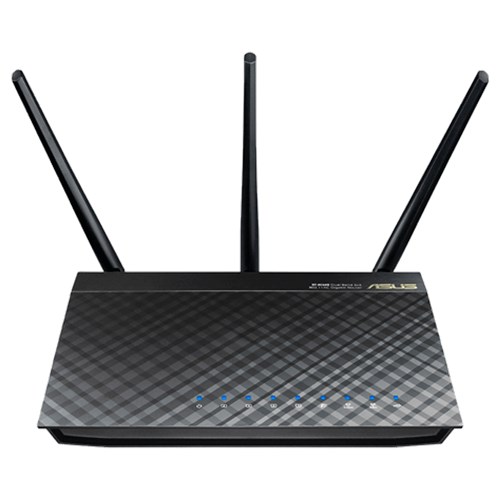Asus RT-AC66U router review
Amazon.com price (90 USD)
Amazon.co.uk price (105 GBP)
Amazon.de (125 Euro)

Technical details:
Dual-band, 802.11ac, up to 1750Mbps
AiRadar intelligently strengthens wireless connections via high-powered amplification and beam-forming
4x gigabit ethernet LAN ports
2x USB 2.0 ports
256MB ram
2.4GHz or 5.0GHz (can be active at the same time)
Web-based interface
Advanced cooling (whatever that means)
The specs are pretty good, especially considering this is not a new (2018) router. Most people now would (rightfully so) expect USB 3.0. The "advanced cooling" sounds like a gimmick or something every router company could say. However I have noticed that it does not get as hot compared to routers I've previously owned (like the Cisco-Linksys E4200). I have not had issues with this router when it comes to heat, and rarely have to restart it.
Speed wise it is able to handle whatever I do. Gaming and streaming netflix works with no problems, even with more than one person on the router.
Connection with Chromecast works great. It may rarely loose connection but usually that is a problem with the chromecast, and only sometimes requires a router restart.
I've owned this router since 2013 and see no point in replacing it. It has not noticeably degraded since then. The only reason I could see upgrading would be to attach a hard drive to it (since this one is only usb 2.0) or maybe to find one that has better web applications. This Asus supports the cloud applications that Asus has, but I haven't been impressed by them and haven't found a good use for them.
A huge problem with this router is that when you attach a hard drive, the CPU goes to 100% constant. I remember trying it a few years ago and at the time there was no fix for it. I haven't checked, but I doubt that there is a fix right now.
Adding a VPN directly on the router is not supported with the default firmware. To do this you need to use other router software like DD-WRT. The one I currently use can be found here. DD-WRT allows you to add a VPN to your router and turn it on/off whenever you want. It supports OpenVPN, PPTP, and TOR.
VPN that I use is called Private Internet Access (PIA).
-
 1
1



3 Comments
Recommended Comments